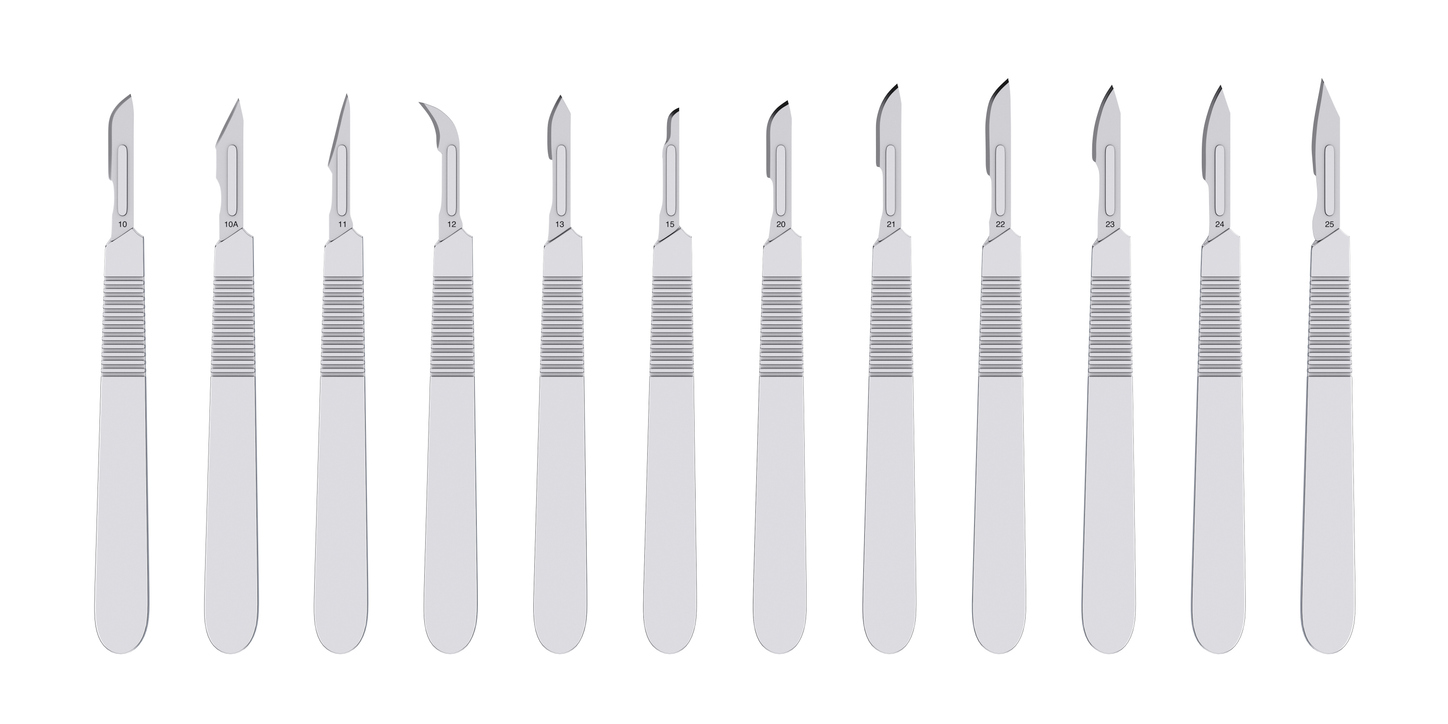The Importance of High-Quality Surgical Blades in Healthcare Centers: Wigmore Trading’s Commitment to Supplying Nigeria and Beyond
The Importance of High-Quality Surgical Blades in Healthcare Centers: Wigmore Trading’s Commitment to Supplying Nigeria and Beyond
Welcome to the blog post that delves into the crucial role of high-quality surgical blades in healthcare centers. In an industry where precision and safety are paramount, there is no room for compromise. That’s why we are thrilled to highlight Wigmore Trading’s unwavering commitment to supplying Nigeria and beyond with exceptional surgical blades. Join us as we explore how these small yet indispensable tools play a significant part in ensuring successful surgeries and ultimately saving lives. So, fasten your seatbelts – it’s time to dive into the world of life-changing sharpness!
Introduction to the Importance of Surgical Blades in Healthcare Centers
Introduction to the Importance of Surgical Blades in Healthcare Centers
Surgical blades are essential tools that play a crucial role in ensuring successful and safe surgeries. Whether it is for a simple incision or a complex operation, the use of high-quality surgical blades is imperative for achieving desirable outcomes. In healthcare centers, surgical blades are used daily by surgeons, doctors, and other medical professionals to perform various procedures. Therefore, it is essential to understand the importance of using high-quality surgical blades in healthcare settings.
The primary purpose of using surgical blades is to make precise incisions on tissue during surgery. These incisions allow surgeons to access internal body parts and perform necessary procedures without causing extensive damage or trauma. Using dull or low-quality surgical blades can result in jagged cuts, increased bleeding, prolonged recovery time, and even infection. In contrast, sharp and high-quality surgical blades can help reduce these risks significantly.
One of the most critical factors in surgeries is time management. Every minute counts when performing a procedure on a patient’s delicate body parts. The use of high-quality surgical blades enables surgeons to complete their tasks efficiently and swiftly while minimizing the risk of complications due to inaccurate incisions or extended operating times.
In addition to precision and speed, using high-quality surgical blades also reduces the risk of cross-contamination and infection. Contaminated instruments are one of the leading causes of infections in healthcare settings.
Understanding the Different Types of Surgical Blades
Surgical blades are an essential tool in any healthcare center, used for a variety of procedures and surgeries. These small but mighty instruments play a crucial role in ensuring successful surgical outcomes, making them an integral part of the medical industry.
There are various types of surgical blades available in the market, each designed for specific purposes and procedures. Understanding these different types is important not only for healthcare professionals but also for patients to have a better understanding of their treatment options.
Here are some of the most common types of surgical blades used in healthcare centers:
1. Scalpel Blades: This is the most commonly used type of surgical blade, consisting of a handle and a replaceable blade. The handle is usually made from stainless steel or plastic and has a textured grip for better control. The blade itself comes in different shapes and sizes to cater to different procedures such as incisions, punctures, and excisions.
2. Safety Scalpel Blades: As the name suggests, these blades are designed with safety features to prevent accidental cuts or injuries during surgery. They often have retractable covers that shield the blade when not in use, reducing the risk of exposure to both patients and medical staff.
3. Suture Removal Blades: These blades have a unique design specifically for removing sutures after surgery. They have sharp edges on both sides which allow for precise cutting along suture lines without causing damage to surrounding tissue.
The Role of Quality in Surgical Blade Selection
Surgical blades are an essential tool in any healthcare center, and their quality is crucial in ensuring successful surgeries and procedures. The selection of surgical blades is not just a matter of choosing the right size or type; it also involves considering the quality of the blade itself. In this section, we will discuss the role of quality in surgical blade selection and its impact on patient outcomes.
Firstly, let’s define what we mean by “quality” when it comes to surgical blades. Quality refers to the overall characteristics and performance of a product. In the case of surgical blades, quality encompasses factors such as sharpness, durability, precision, and sterility. Each of these aspects plays a significant role in determining the effectiveness and safety of a surgical blade.
One of the primary considerations in selecting high-quality surgical blades is their sharpness. A sharp blade is essential for making precise incisions without causing unnecessary tissue damage or trauma to the patient. This not only leads to better aesthetic results but also promotes faster healing and reduces the risk of post-operative complications. High-quality surgical blades undergo rigorous sharpening processes that result in a consistently sharp cutting edge, ensuring optimal performance during surgery.
Durability is another crucial factor to consider when selecting surgical blades. A high-quality blade should be able to withstand multiple uses without losing its sharpness or structural integrity. This not only ensures cost-effectiveness but also minimizes downtime for sterilization and replacement during surgeries.
How Wigmore Trading is Committed to Supplying High-Quality Surgical Blades in Nigeria and Beyond
At Wigmore Trading, we understand the critical role that high-quality surgical blades play in ensuring successful surgeries and patient outcomes. As a leading supplier of medical equipment and supplies in Nigeria, we are committed to providing healthcare centers with top-of-the-line surgical blades that meet international standards.
We believe that every patient deserves the best possible care, which is why we source our surgical blades from reputable manufacturers who use advanced technology and strict quality control processes. This ensures that each blade is made with precision and accuracy, allowing for safe and efficient use during surgical procedures.
Our commitment to supplying high-quality surgical blades goes beyond just meeting industry standards – we strive to exceed them. We continuously monitor market trends and advancements in technology to ensure that our products are always up-to-date and of the highest quality. This also enables us to offer a wide range of options to cater to the diverse needs of healthcare facilities across Nigeria.
One of the key factors that set us apart from other suppliers is our rigorous testing process. Before any product reaches our customers, it goes through extensive testing by our team of experts. This includes checking for sharpness, durability, rust resistance, and overall performance. Only when a blade passes all these tests do we deem it fit for distribution.
We also prioritize safety in all aspects of our business operations. Our team conducts thorough research on the materials used in making surgical blades to ensure they are free from harmful substances or toxins. Additionally, all our products come with proper labeling and instructions for safe handling and disposal.
Benefits of Using High-Quality Surgical Blades in Healthcare Centers
The use of high-quality surgical blades in healthcare centers is crucial for achieving successful surgical outcomes and promoting patient safety. From the initial incision to the final suturing, every step of a surgical procedure relies on precision and accuracy, which can only be achieved with the right tools.
In this section, we will delve into the various benefits of using high-quality surgical blades in healthcare centers:
1. Precision and Accuracy: High-quality surgical blades are designed with sharp edges that allow surgeons to make precise incisions without causing unnecessary trauma to surrounding tissues. This level of precision is especially important for delicate surgeries or procedures where organs or nerves are involved.
2. Reduced Risk of Infection: The use of low-quality or dull blades can increase the risk of infection during surgery as they may cause tissue damage and leave jagged edges that are difficult to clean properly. On the other hand, high-quality surgical blades are made from sterile materials and have smooth, razor-sharp edges that minimize tissue trauma and reduce the risk of infection.
3. Faster Healing Time: When using high-quality surgical blades, surgeons can make clean cuts that heal faster compared to those made with low-quality blades. This is because a clean cut causes less damage to surrounding tissues, allowing for quicker healing and reduced scarring.
4. Cost-Effective: While high-quality surgical blades may have a higher upfront cost than their low-quality counterparts, they prove to be more cost-effective in the long run.
Case Studies: Success Stories from Hospitals and Healthcare Centers Using Wigmore Trading’s Surgical Blades
Case studies provide real-life examples of how a product or service has benefited an individual or organization. In the case of Wigmore Trading’s surgical blades, these success stories highlight the impact that high-quality blades have had on hospitals and healthcare centers in Nigeria and beyond.
One such success story comes from a hospital in Lagos, Nigeria. The hospital was facing issues with frequent blade breakages during surgeries, leading to extended operating times and increased risk for patients. This not only caused frustration among the surgical team but also impacted patient outcomes.
Upon switching to Wigmore Trading’s surgical blades, the hospital reported significant improvements in both performance and durability. The precision-engineered blades were able to withstand the demands of complex surgeries without any breakages, resulting in smoother procedures and reduced risks for patients. The surgical team also appreciated the ergonomic design of the blades, which made it easier for them to maneuver during delicate procedures.
In another case study from a healthcare center in Ghana, Wigmore Trading’s surgical blades played a crucial role in improving efficiency and reducing costs. Prior to using these high-quality blades, the healthcare center was spending a substantial amount on blade replacements due to their short lifespan. However, with Wigmore Trading’s surgical blades’ longer life span and superior cutting ability, there was a significant decrease in expenditure on blade replacements.
Moreover, the healthcare center noticed a reduction in post-operative complications due to cleaner incisions made by these precision-crafted blades.
Tips for Proper Maintenance and Disposal of Surgical Blades
Proper maintenance and disposal of surgical blades is crucial for ensuring safe and effective surgeries. Not only does it help prevent the spread of infections, but it also ensures that the blades are in optimal condition for use, reducing the risk of complications during procedures. In this section, we will discuss some important tips for maintaining and disposing of surgical blades.
1. Always follow proper sterilization protocols: Before and after each use, surgical blades must be properly sterilized to eliminate any potential bacteria or contaminants. This can be done through methods such as autoclaving or chemical disinfection. It is important to strictly follow recommended protocols to ensure the effectiveness of the sterilization process.
2. Inspect blades before and after use: Before using a surgical blade, it should be carefully inspected for any signs of damage or wear. If there are any nicks, cracks, or other defects in the blade, it should not be used as it can compromise the safety and efficacy of the surgery. After use, inspecting the blade again can help identify any damage that may have occurred during the procedure.
3. Proper handling and storage: Surgical blades should be handled with care to avoid bending or breaking them. They should also be stored in a clean and dry environment to prevent rusting or contamination from external factors.
4. Sharpening and maintenance: Regularly sharpening surgical blades is essential for maintaining their sharpness and effectiveness during surgeries.
Conclusion:
Conclusion:
The importance of high-quality surgical blades in healthcare centers cannot be overstated. These small but crucial instruments play a vital role in ensuring safe and successful surgeries, as well as minimizing risks of infection and complications for patients.
At Wigmore Trading, we understand the critical role that surgical blades play in healthcare, which is why we are committed to supplying only the highest quality products to our customers in Nigeria and beyond. Our partnership with leading global brands such as Swann-Morton and Feather ensures that we offer a wide range of options to meet various surgical needs.
Our commitment to quality goes beyond just supplying reliable products; we also provide ongoing support and education for our customers on proper blade handling, sterilization techniques, and disposal methods. This not only helps ensure the longevity of our products but also promotes safer practices in healthcare settings.
Moreover, our extensive distribution network allows us to reach even the most remote areas in Nigeria and other African countries, making it easier for healthcare facilities to access high-quality surgical blades at competitive prices.
We also understand the financial constraints faced by many healthcare centers, especially those in developing nations. Therefore, we offer flexible payment options and work closely with our clients to find affordable solutions without compromising on quality.
In addition to providing superior products and services, Wigmore Trading is fully committed to promoting ethical business practices. We adhere strictly to international regulatory standards for medical devices and follow sustainable sourcing practices that prioritize fair labor conditions for workers involved in the production process.






Comments are closed.